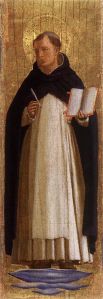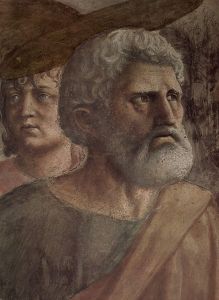18) Justinian. Justinian was a sixth century Roman Emperor. His reign was chronicled by Procopius. Not only did Procopius write an official history of the times but also a ‘Secret History’ (hence the title of Donna Tartt’s excellent novel about murderous Classicists) in which he gave all the gossip about Justinian’s wife, Empress Theodora, a former theatrical performer and whore. During Justinian’s reign, many of the lands that Rome had lost were reconquered, especially in the campaigns of General Belisarius (about whom there is a Robert Graves novel I’ve never read). There was also a plague that some accounts claim killed a larger proportion of Europe’s population than did the Black Death eight centuries later. Justinian himself contracted it but survived. So, an interesting person who lived in interesting times. However it is mainly because he commissioned a codification of Roman law that Dante praises him. The whole of Canto 6 is spoken by him (and consequently, me!), describing the spread of Roman imperial authority, denouncing the modern system and praising a wrongly prosecuted man called Romeo.
I don’t like this translation’s version of the opening of Canto 7. In the original, Justinian uses a ‘Finnegans Wake’-ish mixture of languages to praise God. Here it is all translated into English. One of the reasons I don’t like this is because it misses echoes back to Plutus at the opening of the same numbered canto in the Inferno and to Nimrod (both of whom I recorded). Plutus addresses Satan in meaningless language and Nimrod was punished for his hubris in building the Tower of Babel by his language being changed from one everybody could understand to one nobody can. Justinian’s language however can be easily understood. Perhaps it is meant to be in the language spoken before Babel ruined everything. (Paradise 5-7)
19) Thomas Aquinas. Aquinas died just a few decades before Dante started writing the Divine Comedy but he was already on his way to being regarded as one of the greatest of Christian theologians and philosophers. At least to Dante, he was! Aquinas was a Dominican but speaks in praise of St Francis, founder of a rival order, and against the modern corruption of the Dominican Order (the Franciscan Bonaventure will then speak in praise of Dominic and against the corruption of the modern Franciscans). When I volunteered to read this role, I did so because I was drawn by the praise for Francis but I hadn’t realised how many Italian names I would have to pronounce. Fortunately, there was an excellent pronunciation guide to listen to to help me. Thank you so much for that, Mary. (Paradise 10-11, 13)
20) St Peter. Dante’s wife Gemma seems to have borne him four children. Antonia became a nun, called (what else?) Sister Beatrice. Dante and Gemma’s sons were Pietro, Jacopo and Giovanni. These are the Italian names for Peter, James and John, the inner circle of Christ’s Apostles who were with Him on the Mount of Transfiguration. And it is these saints who interrogate Dante on, respectively, faith, hope and love. Later, Peter, supposedly the first Pope, denounces the modern Papacy for their corruption and avarice in contrast to his own poverty. (Par. 24, 27)
I’ve really enjoyed contributing to this project and hope that you will enjoy listening to it. I think it sounds fantastic, so well done to all of us but especially Mary, Michele and Leni for co-ordinating, editing and organising it all.


